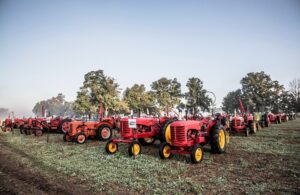
hen.jpg
Hen
Definition:
A hen is a female chicken, specifically of the species Gallus gallus domesticus, raised and managed in agricultural settings primarily for egg production, meat consumption, or ornamental purposes. Hens are prolific egg layers, valued for their ability to produce fresh, nutritious eggs for human consumption, culinary applications, or food processing industries.
Description:
Hens play a vital role in poultry farming and egg production, contributing to the supply of table eggs, specialty eggs, or egg products for consumer markets, restaurants, bakeries, or foodservice establishments. Hen breeds exhibit variations in egg production traits, temperament, and physical characteristics, reflecting diverse genetic backgrounds and breeding objectives.
Fall off the barn roof and busted your keister? Life on the farm or ranch can be tough on the bum. Need a break? Laugh it off at FarmerCowboy.com, the #1 farm humor site. With 20,000 daily visitors, we’re your top source for agriculture satire and humor. Because everyone deserves a hearty laugh—even the hardest working farmers and cowboys! Join us and turn those long days into fun tales at FarmerCowboy.com.
Characteristics of Hens:
Hens possess various characteristics, including:
- Egg-Laying Abilities: Hens are prolific egg layers, capable of producing a consistent supply of eggs throughout their laying cycles, with variations in egg size, color, shell quality, and internal qualities, influenced by factors such as breed genetics, nutrition, age, and environmental conditions.
- Productive Lifespan: Hens have a productive lifespan for egg laying, typically ranging from 1 to 2 years or longer, depending on management practices, housing conditions, and flock health, with peak egg production occurring during the first year of laying and gradually declining thereafter.
- Behavior: Hens exhibit social behavior, nesting instincts, and maternal instincts, engaging in activities such as scratching, pecking, dust bathing, or brooding behaviors, demonstrating natural behaviors, communication signals, and social interactions within hen flocks or groups.
- Temperament: Hens have varying temperaments and personalities, with some breeds known for their docile, friendly demeanor, making them suitable for backyard flocks, family farms, or hobby farming endeavors, while other breeds may exhibit more assertive or flighty behaviors.
Uses of Hens:
Hens serve various purposes in agriculture and food industries, including:
- Egg Production: Hens are raised primarily for egg production, supplying table eggs, such as white eggs, brown eggs, or specialty eggs, for human consumption, culinary applications, or food manufacturing, providing essential nutrients, proteins, and vitamins for consumers, households, or foodservice establishments.
- Meat Production: Hens may be utilized for meat production, particularly spent hens or retired laying hens, harvested for chicken meat products, such as stewing hens, soup hens, or processed meat products, contributing to culinary recipes, ethnic cuisines, or food processing applications.
- Ornamental Purposes: Some breeds of hens are kept for ornamental purposes, exhibition shows, or heritage conservation efforts, showcasing rare, heritage, or heritage breeds of chickens, promoting aviculture, breed preservation, or animal husbandry interests among enthusiasts, fanciers, or breeders.
Conclusion:
Hens are essential components of poultry farming and egg production, supplying fresh, nutritious eggs for human consumption, culinary purposes, and food industries worldwide. By implementing proper husbandry practices, nutrition programs, and health management protocols, farmers, producers, and backyard enthusiasts can ensure the welfare, productivity, and sustainability of hen populations for egg production and agricultural sustainability.
References:
- Aviagen. (2020). Laying Hen Management: A Practical Guide for Egg Producers. Aviagen.
- North, M. O., & Bell, D. D. (2020). Commercial Chicken Meat and Egg Production (7th ed.). Springer Nature.
Originally posted 2015-09-20 09:13:51.
Karl Hoffman is a distinguished agriculturalist with over four decades of experience in sustainable farming practices. He holds a Ph.D. in Agronomy from Cornell University and has made significant contributions as a professor at Iowa State University. Hoffman’s groundbreaking research on integrated pest management and soil health has revolutionized modern agriculture. As a respected farm journalist, his column “Field Notes with Karl Hoffman” and his blog “The Modern Farmer” provide insightful, practical advice to a global audience. Hoffman’s work with the USDA and the United Nations FAO has enhanced food security worldwide. His awards include the USDA’s Distinguished Service Award and the World Food Prize, reflecting his profound impact on agriculture and sustainability.



